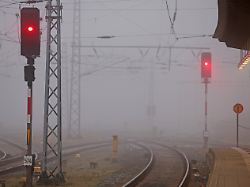Train fails again
Train drivers can continue the strike as planned
March 12, 2024, 1:56 p.m
Listen to article
This audio version was artificially generated. More info | Send feedback
The train drivers also receive the green light for their strike in the second instance. This means the strike can continue. The railway suffered another bankruptcy in court.
Deutsche Bahn train drivers can continue their strike as planned until Wednesday morning. The railway also suffered a legal defeat in the second instance. The Hessian State Labor Court rejected the company’s appeal. The Frankfurt Labor Court had previously rejected the urgent application for an interim injunction against the strike. The GDL’s wave strike as a pinprick tactic is permissible, said presiding judge Michael Horcher. He suggested going to formal arbitration. There are no legal appeals against the decision.
The new nationwide train drivers’ strike in long-distance and local transport began during the night. The train drivers went on a 24-hour strike at 2 a.m. The strike in freight transport had already started at 6 p.m. The railway was outraged by the announcement of what was now the sixth industrial action and the first of the union’s so-called wave strikes in this collective bargaining round. However, the courts declared the industrial action to be proportionate.
The federal government had declared that it would stay out of the dispute at the state-owned company. Both sides should keep an eye on the impact on people, said government spokesman Steffen Hebestreit. Minister Volker Wissing’s Ministry of Transport emphasized that the appeal was aimed primarily at the GDL. A formal arbitration procedure is necessary. The GDL is overreaching, said a spokesman.
In Deutsche Bahn’s opinion, anyone who demands a reduction in working hours from 38 to 35 hours and could get 36 hours in an overall package should not paralyze an entire country. The GDL had called for a new and improved offer from the railway in order to avoid strikes. The railway, in turn, offered new negotiations at the weekend based on a concept developed by moderators in the previous round of negotiations. Among other things, this provided for a weekly working time for shift workers of 36 hours with full wage compensation; currently it is 38. However, the GDL is calling for a reduction to 35 hours.
